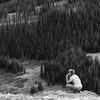March 5, 2015 - 15:41

Maybe, rather than a distinct poetry/prose dichotomy in the structure of words—chapter vs. verse, narrative vs. exposé—we need to blur those lines and look more closely at "poet" as the word. I think if we disassociate "poet" from poetry as solely a genre category, we can open up some different conversations beyond the poetry/prose binary. Maybe a poet, like Nirmal, doesn't have to solely write in the genre poetry. If anything, Nirmal shows us that a poet, or one who "lives through poetry", does not have to fit into a poetry/prose dichotomy. Nirmal tells a story, interweaving other stories, histories, knowledges, mythologies, experiences, voices, and poems. He doesn't just stick to poetry as a genre; he expands it out into a way of writing through poetry. The poet refuses to only describe a play-by-play account of what happened. The poet writes to "motion" towards "the thing itself." But a good poet doesn't attempt to directly name the thing itself precisely because they know that language can only circle around it—just as Rilke (translated by Joanna Macy) writes:
...I circle around God, around the primordial tower.
I've been circling for thousands of years
and I still don't know: am I a falcon,
a storm, or a great song?
I think the distinction is less between poetry and prose, but moreso between what you said with showing and telling. When I tell something, I say, "Here's what this is." When I show something, I ask, "What do you think?" Poetry, or the poet themself, is perhaps a kind of euphemism of one who engages in the flipping of statement to question that Haraway wanted us to consider: instead of asserting "You are human," poets (and speaking poetically, that is, speaking while gesturing to soomething more) invite us to ask, "Who are you?"
This, I think, is why I personally find that Rilke can, even through decades of separation, pierce through the thick with his words. It's not that he sums up an experience I find in common in his poetry, but that he speaks so powerfully to something stretching beyond language, an indescribable yearning towards belonging, towards something beneath the surface ripples of language.
Thoughts on this? On poetry? On Rilke? I like how this conversation has looked, too, at the problematic/assumptive wording of our barometer question: raw being "undone", poetry/prose being genres, and the like.
